On 23 July 1885, Ulysses S. (“Unconditional Surrender”) Grant, Civil War hero and the nation’s 18th president, died a painful and impoverished death at the age of 63. He spent the last months of his life grappling with the ravages of throat cancer, desperately writing his life’s memoirs so that his family would not be destitute after he was gone.
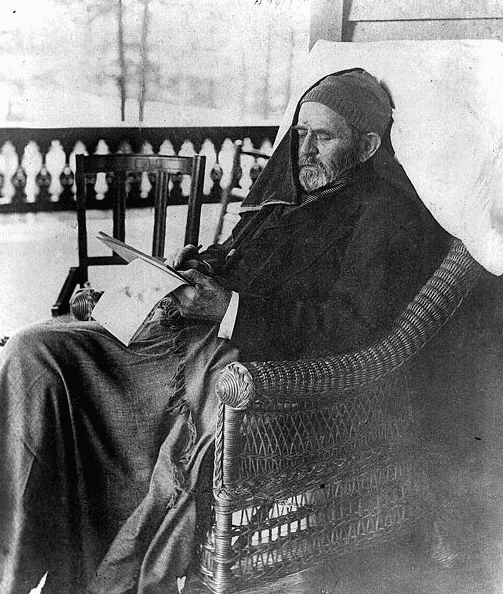
His good friend Mark Twain had urged Grant to write the memoirs and ensured that they were lucrative enough that Grant, in the very last act of his life (the memoirs were finished just days before he died) finally – after a lifetime of business failures – achieved financial success for his family.
Grant led a remarkable life, filled with equal parts achievement and failure. A mediocre student at West Point, he performed well during the Mexican-American War and was promoted for his bravery, only to have his military career derailed by his drinking.
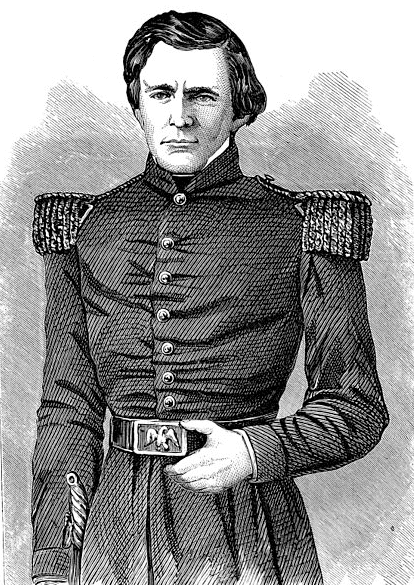
He abruptly resigned from the army on 31 July 1854 under the threat of court-martial. He then struggled for the next seven years. He failed as a farmer in Missouri, using his father-in-law’s slaves; Grant even bought one of the slaves. He tried other occupations and business ventures but failed at them all. Finally, in 1860, his father gave him a job as an assistant in his tannery, where Grant was toiling when the Civil War broke out.
The Union Army was desperate for good leaders and Grant seized his chance, beginning a meteoric rise to become the leader of all Northern armies.
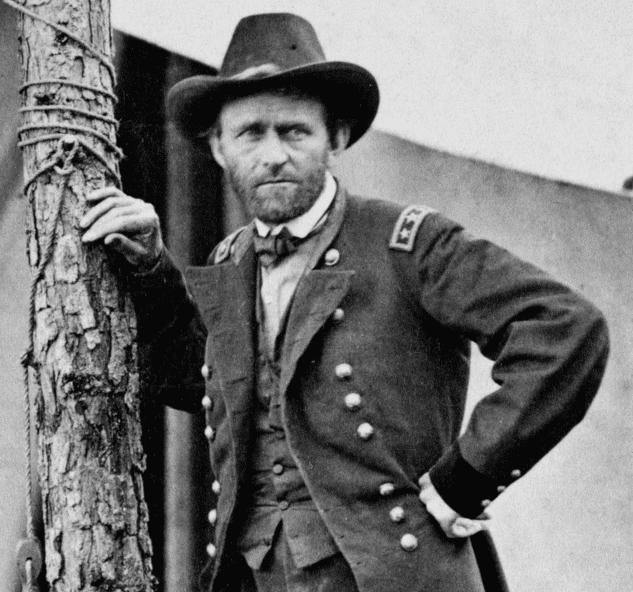
He won the Union’s first two major victories, at Fort Henry and Fort Donelson, staved off near-defeat at the Battle of Shiloh after failing to take proper precautions, split the Confederacy in two by controlling the Mississippi River with the capture of Vicksburg, then led an inexorable, bloody campaign to grind down the Confederacy, culminating in the surrender of Robert E. Lee and the Army of Northern Virginia at Appomattox Court House on 9 April 1865.
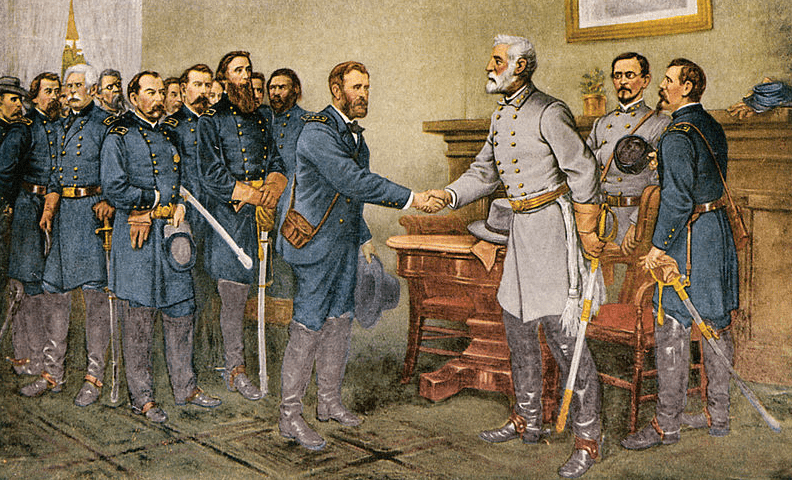
After the war Grant was elected president in 1868 and served two terms, but his Administration was racked by scandal and corruption, and his presidency ended with Grant held in very low esteem by the American public.
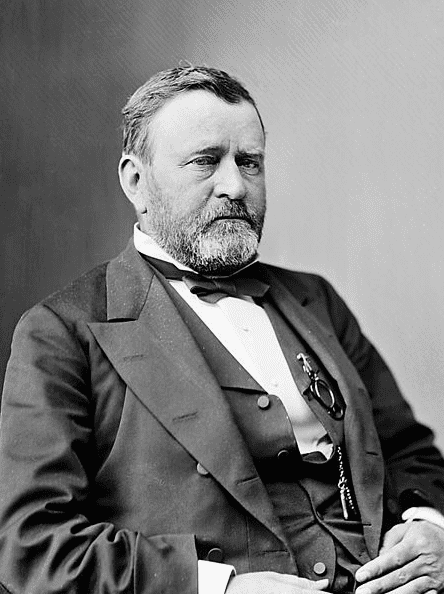
More business failures followed his presidency, with his family sinking deeply into debt (Grant had forfeited his military pension by becoming president, and U.S. presidents did not receive a pension until 1958). His final days were darkened by an agonizing nine-month battle with cancer as he raced against time, in constant pain, to do one successful thing for his family’s finances before he died: write his memoirs.
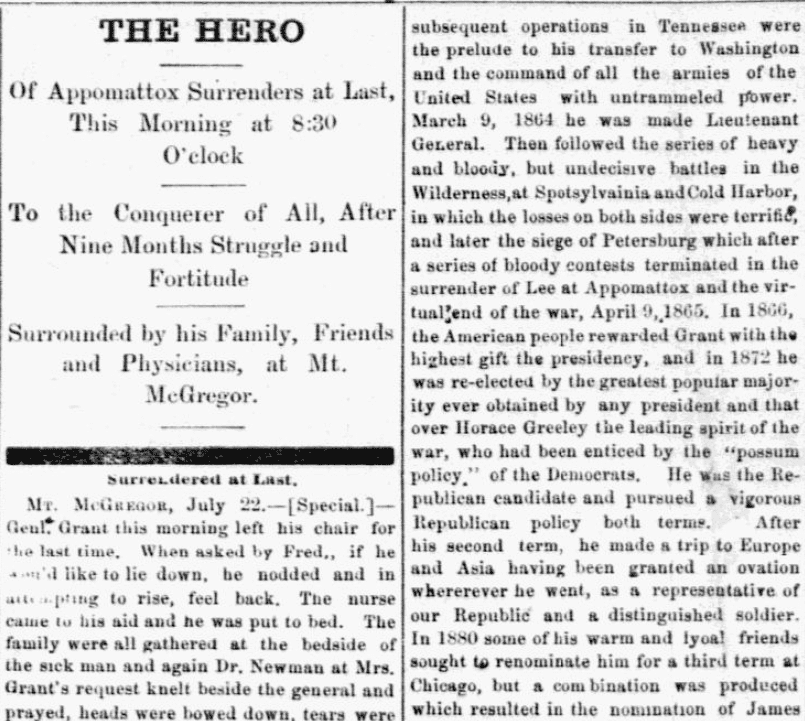
Here is a transcription of this article:
THE HERO
Of Appomattox Surrenders at Last,
This Morning at 8:30 O’clock
To the Conqueror of All,
After Nine Months Struggle and Fortitude
Surrounded by His Family, Friends and Physicians,
At Mt. McGregor
Surrendered at Last.
Mt. McGregor, July 22. – [Special.] – Gen. Grant this morning left his chair for the last time. When asked by Fred. if he would like to lie down, he nodded and in attempting to rise, fell back. The nurse came to his aid and he was put to bed. The family were all gathered at the bedside of the sick man and again Dr. Newman at Mrs. Grant’s request knelt beside the general and prayed, heads were bowed down, tears were on the cheeks of men as well as women. The doctors stood somewhat apart and the family was near its fast-sunk head, and then after an hour death seemed a little less rapidly going on, on the man it has pursued just nine months today, for it is just nine months ago today that General Grant walked into Dr. Douglass’ office to seek his professional aid for the cancer that has done what foes and war could not.
The general answered “yes and no” to several questions. Time passed slowly indeed and at length at fifteen minutes past eight, Dr. Douglass left the cottage. “How is it, doctor?” was asked him. “He is dying,” said the gray-haired physician. “Will he live an hour?” was asked again. “Oh yes, and possibly more, but he is passing away,” was the response, and after a little time at the hotel Dr. Douglass returned to the cottage. At nine the general’s pulse was up to [the] point of one hundred and sixty-five to the minute and was fluttering. After his rally at about nine o’clock General Grant sank into sleep that was described by a witness as the peaceful and beautiful sleep of a child. The general continued in a somnolent condition during the day, the respirations growing more shallow.
Barely Alive.
Mt. McGregor, July 23, 5:25 a.m. – The respirations have increased to sixty, and the death rattle occasioned by the filling up of the lungs and throat with mucous, is heard. He now recognizes his friends by opening his eyes.
8:30 a.m. – The General is dead, having just breathed his last surrounded by his family, friends and physicians. The remains will be taken to New York, where they will probably lie in state and be placed in charge of Gen. Sheridan according to the general’s request.
Washington, D.C., July 23. – [Special.] – The death of Gen. Grant, though not unexpected, casts a pall over all classes and conditions of men. All the departments will be promptly closed and draped in honor of the dead hero. The usual proclamations will be issued.
Biographical.
Ulysses S. Grant was born April 27th, 1822, at Point Pleasant, Ohio. It is generally asserted that his father, Jesse R. Grant, was of Scotch descent. He received a common school education and later a military education at West Point, where he graduated 25th in a class of 35, June 30, 1843. He entered the U.S. service as brevet, 2nd Lt. infantry at Jefferson Barracks, St. Louis, Mo., where he became acquainted with Miss Julia B. Dent, whom he married August 22nd, 1848, after his return from the Mexican war, where he served under Taylor to Monterey, at which place he was Adjutant. He served also under Scott from Contreras to Mexico, and at Chepultepec was promoted to 1st Lieutenant for bravery.
After his marriage he moved to Sackett’s Harbor, New York, where they commenced housekeeping. He then lived at various points at periods down to March, 1860, when his father made him a clerk at Galena, Ill. That year he cast his first vote, which was for Buchanan. He had, however, been a quiet Democrat. He was, however, dissatisfied with Douglas, and when Lincoln was elected, joined in the rejoicings.
When the war broke out, he went to Cincinnati to apply to McClellan, who was then organizing the militia of Ohio, but failing to see that officer, returned again to Galena without making known his errand. On his return he was soon put in command of a regiment forming at Decatur, quite accidentally, and marched to Southern Missouri. He occupied Paducah, Ky., and headed off a Confederate column at Belmont which he defeated.
Much delay followed. In February 1862, however, he was permitted to move against Fort Henry which was captured by Foote before the land forces arrived. His first signal victory was at Fort Donelson where he captured Gen. Buckner who lately visited him, and about 10,000 men. He here won the name of “Unconditional Surrender” Grant because he replied to Buckner’s message, “What terms?” “Unconditional surrender.” Then followed Pittsburg Landing [Shiloh], and Vicksburg, the latter place surrendering with 40,000 men under Pemberton., July 4th, 1863, on the same day that Lee was driven back broken and dismayed from Gettysburg, by Meade.
His subsequent operations in Tennessee were the prelude to his transfer to Washington and the command of all the armies of the United States with untrammeled power. March 9, 1864, he was made Lieutenant General. Then followed the series of heavy and bloody, but indecisive battles in the Wilderness, at Spotsylvania and Cold Harbor, in which the losses on both sides were terrific, and later the siege of Petersburg which after a series of bloody contests terminated in the surrender of Lee at Appomattox and the virtual end of the war, April 9, 1865.
In 1868, the American people rewarded Grant with the highest gift – the presidency, and in 1872 he was re-elected by the greatest popular majority ever obtained by any president – and that over Horace Greeley, the leading spirit of the war, who had been enticed by the “possum policy” of the Democrats. He was the Republican candidate and pursued a vigorous Republican policy both terms. After his second term, he made a trip to Europe and Asia having been granted an ovation wherever he went, as a representative of our Republic and a distinguished soldier. In 1880 some of his warm and loyal friends sought to re-nominate him for a third term at Chicago, but a combination was produced which resulted in the nomination of James A. Garfield.
He took up his residence in New York soon after his return from Europe and resided there until his removal to Mt. McGregor about a month ago. His last days have wonderfully lifted the veil of his life and stamped his character with not only heroism but fortitude. First came the failure of his banking house, which so nearly prostrated him, and the accident by which he was lamed for the rest of his days and then the fatal and insidious cancer which has sapped away his life and palsied his energy.
His literary labor during the past six months now ended by death, will be one of the marvels of his life. The spectacle of the “silent man,” as his adversaries were wont to call him, making history in the face of death, has but one known prototype – the dying Socrates teaching the immortality of the soul to his weeping students, with the hemlock poison in his hands.
Note: An online collection of newspapers, such as GenealogyBank’s Historical Newspaper Archives, is not only a great way to learn about the lives of your ancestors – the old newspaper articles also help you understand American history and the times your ancestors lived in, and the news they talked about and read in their local papers. Did any of your ancestors serve in the Civil War? Please share your stories with us in the comments section.

I had a great number of ancestors who fought for the Confederacy, several were officers and yes, slave owners. I also had a great number that were never slave owners and served in the lowest ranks. My great, great grandfather fought at Gettysburg, and he with his unit helped save the town of Wrightsville PA from burning when the Union army burned the bridge. He was wounded and captured at Hatcher’s Run. Several of my family served as Surgeons during the war.
It sounds like you’ve researched a lot of your family history, Sherri — well done. Thanks for writing.
This is inaccurate depiction of Pres. Grant’s history…He actually was given a slave by his wife’s father and he freed this man, turning down a profit if he had sold the man, despite Grant’s poverty.
Thanks for taking the time to write us, Joe. You are correct that Grant freed that slave instead of selling him, even though Grant desperately needed money. It is also true that Grant did not approve of slavery. However, I’m not sure my article gave an “inaccurate depiction” of Grant. The only sentence in my article regarding slavery is this: ” He failed as a farmer in Missouri, using his father-in-law’s slaves; Grant even bought one of the slaves.” This sentence is correct. During 1857 Grant moved his family to his father-in-law’s farm (Fred Dent) in Missouri. Dent used slaves on his farm, and when Grant began managing his father-in-law’s farm, he continued (albeit reluctantly) to use the slaves. It’s also true that Grant once bought a slave. So I maintain my article is not inaccurate, but, again, I appreciate you writing, and providing the opportunity to make clear that even though Grant once managed slaves, and even bought one, he never approved of slavery.